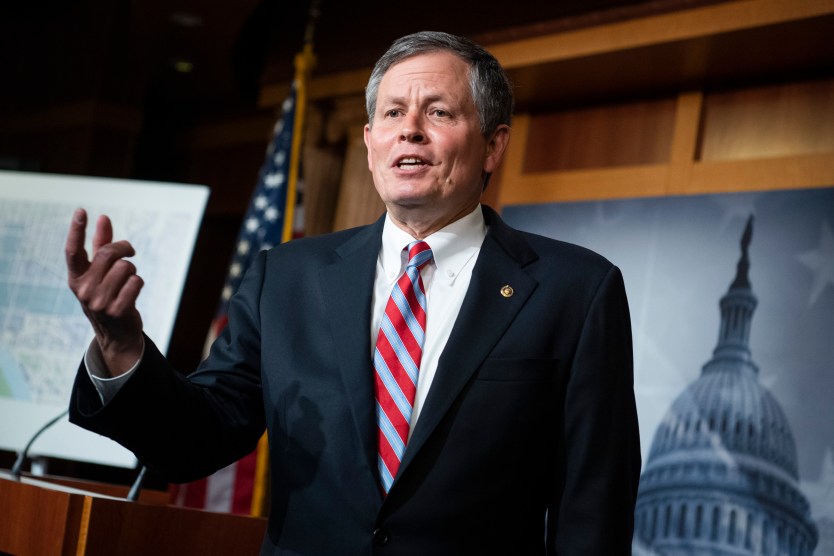
Rep. Deb Haaland, a New Mexico Democrat, is poised to become Secretary of the Interior.Illustration: Deandria Mackey/HuffPost; Photos:Getty
This story was originally published by HuffPost and is reproduced here as part of the Climate Desk collaboration.
In October 2019, Rep. Deb Haaland (D-N.M.) led a House subcommittee hearing on the effects of anti-government extremism on federal land management officials. The Government Accountability Office had recently documented more than 350 incidents of threats and assaults targeting land management employees between 2013 and 2017.
As the watchdog group noted, even that data did not capture the full picture, in part because not all incidents are reported. Some officials told investigators they “consider receiving threats a normal part of their job.”
Haaland, then in her first congressional term, stressed that these “extremist ideologies did not develop in a vacuum.” She read aloud a quote from former Sen. Dean Heller (R-Nev.) on the 2014 armed standoff between federal agents and militias at Nevada rancher Cliven Bundy’s ranch, in which Heller praised the militiamen as “patriots.” And she noted that Nevada state Rep. Michele Fiore had supported the armed militants who took control of Malheur National Wildlife Refuge in Oregon in 2016. Fiore, a Republican, dismissed the Bureau of Land Management at the time as “a bureaucratic agency of basically terrorism.”
Now, Haaland is about to take the reins of the Interior Department. A Senate committee advanced her nomination Thursday, and she is expected to get a final vote within the next few weeks. She would make history as the first Native American Cabinet secretary, and the first Native American to lead the federal agency that employs more than 70,000 people, manages 500 million acres of federal land—roughly a fifth of the United States—and sets policies for natural resource extraction.
Haaland’s ascent comes at a particularly volatile moment, in the wake of a violent Capitol insurrection that included members of many of the same anti-government militia groups that have waged war on the Interior Department. And it comes after four years of the Trump administration, which coddled anti-federal land zealots and prioritized natural resource extraction over all else.
All of this has public land advocates and experts who track far-right groups worried about the risk of armed conflict between federal agencies and anti-government militias.
Steve Pedery, conservation director at Oregon Wild, expects Haaland will be tested early. “It’s unfortunate, but I guarantee we’ll see the Bundys pull something again,” he said.
In fact, Bundy has already threatened violence. In an interview in January, days before President Joe Biden’s inauguration, Bundy warned that he and his allies would “walk forward towards guns” if the new administration attempted to collect long-overdue grazing fees and round up his cattle. That’s what the Obama administration tried unsuccessfully to do in 2014. Bundy has now been grazing his cattle illegally on public lands for over two decades.
Bundy also praised the violent mob of Donald Trump supporters who stormed the Capitol on Jan. 6 in an attempt to overturn the results of the 2020 election. On Facebook, Bundy wrote that “you can’t clean the swamp by standing off at a distance and smelling it”—a nod to Trump’s campaign claims that he would “drain the swamp” of special interests in Washington.
Aaron Weiss, deputy director of the Colorado-based conservation group Center for Western Priorities, worries the powder keg is now just waiting for a light.
“I do think it’s not an if, but a when,” he said.
An Emboldened Movement
Trump’s four years in office greatly empowered anti-government extremists.
His Interior Department repeatedly hosted people who want to see federal lands sold off. Fierce critics of endangered species protections and federal land management were tapped for powerful department posts. William Perry Pendley, a conservative lawyer with extreme anti-environmental views who spent his career lobbying for the sale of federal lands, was put in charge of Interior’s Bureau of Land Management.
Trump issued pardons for people like Utah state Rep. Phil Lyman (R)―who in 2014 led anti-federal land protesters on an illegal ATV ride on public lands that were off limits to off-road vehicles―and Dwight Lincoln Hammond Jr. and Steven Hammond, the father-son Oregon ranchers whose arson conviction preceded the armed takeover of the Malheur refuge.
On the final day of Trump’s presidency, then-Interior Secretary David Bernhardt restored the Hammonds’ grazing permit, which was revoked after the two men were convicted of intentionally setting fire to federal land.
Along with pardoning some of their criminal activity, Trump at times applauded violent radicals, including the pro-Trump insurrectionists who stormed the Capitol, as “patriots.”
On the flip side, Trump administration officials derided environmentalists as domestic extremists. Ryan Zinke, Trump’s first interior secretary, blamed “environmental terrorist groups” for catastrophic wildfires in the West. And decades before joining the Trump administration, Pendley and his organization, the Mountain States Legal Foundation, set up a hotline for the public to report “acts of environmental terrorism” and held conferences on “eco-terrorism,” as HuffPost previously reported. Pendley was once a key figure of the so-called “Wise-Use movement,” a group of anti-government organizations that gained momentum in the 1980s and pushed to boost mining, drilling and logging on federal lands, vilifying environmentalists along the way.
The Biden administration has vowed to put public lands to use as it pursues aggressive federal action to combat the climate and extinction crises. It has issued a slew of early executive orders, which among other things temporarily paused new oil and gas leasing on federal lands and waters and canceled a key permit for the Keystone XL oil pipeline. It also set a goal of protecting 30 percent of America’s lands and waters by 2030, an effort that’s expected to kick off with Biden restoring protected sites that his predecessor dismantled, including the Bears Ears and Grand Staircase-Escalante national monuments in southern Utah.
Biden’s environmental agenda has infuriated lawmakers from fossil fuel-producing states, and could ultimately collide with extremist organizations like the Oath Keepers and Three Percenters, two of the militia groups that flocked to the Bundy ranch in 2014, to Malheur in 2016 and to the Capitol riot in January. Both groups have long records of threatening violence against public land officials in the West, and a DeSmog investigation last year revealed that numerous Three Percenters members work in oil fields in various Western states.
“As the new administration comes in and tries to enforce rules, there’s the potential for violence on a greater scale,” said Montana author Betsy Gaines Quammen, who published a book last year on the Bundy family and the religious roots of the anti-public lands movement.
Republicans whose campaigns are bankrolled in no small part by extractive industries have turned to some familiar rhetoric to attack Haaland. GOP senators including Steve Daines (Mont.), who has a history of railing against what he calls “fringe environmental extremists,” have painted Haaland as a “far-left ideologue” and “radical” threat to the American “way of life,” citing her support for the Green New Deal and previous statements opposing hydraulic fracturing, oil pipelines and new fossil fuel leasing on federal lands.
Deb Haaland is an environmental extremist, particularly on the matter of 'climate change.' Her worldview as interior secretary will become policy, and will adversely impact the way you desire to live your life. But you didn't think about that when you voted for Biden, did you? https://t.co/eSjf7K0i1S
— Darrell B. Harrison (@D_B_Harrison) December 17, 2020
“It is interesting to me how much of the opposition to her is inextricably linked to the fact that she’s an Indigenous woman, and that opponents assume that if she is confirmed and advocates for Indigenous interests on public lands, it would automatically be bad for them,” said Pedery, of Oregon Wild. “Kind of a tacit acknowledgement that the exploitation of public lands for logging, oil and gas, mining and cattle in the Western U.S. over the last 150 years is inextricably linked with a history of racism and genocide against Indigenous people.”
Flashes From The Past
Right-wing groups are already busy generating opposition and outrage to Haaland online.
On MeWe, a social media platform where extremists and conspiracy theorists are rampant, a user recently circulated a post from the group Montana & Conservative Values about how Daines had exposed Haaland’s “hostility to Western energy jobs and industry.” In reality, during her confirmation hearing, Haaland told Daines and other lawmakers she’d fight for fossil fuel workers, that she understood the importance of oil and gas revenue to funding community services, and that “fossil energy does and will continue to play a major role in America for years to come.”
Elsewhere, folks like Sam Faddis, a former CIA agent and 2018 Republican Senate candidate, have peddled a conspiracy theory that the Communist Party of China may have hand-picked Haaland for the post.
More broadly, at least one of the Biden Interior Department’s early actions has garnered the attention of gun rights groups and the far right. Last week, the agency rescinded the Trump administration’s 11th-hour decision to restore the Hammonds’ grazing permits.
“The Left simply cannot wait for more bloodshed,” the Oregon Firearms Federation, a pro-gun group, wrote in a MeWe post that linked to The Oregonian’s coverage of the permit revocation.
“If ever there was a patriot group #BFYTW kind of moment, this is it,” conservative Oregon radio host Bill Meyer wrote on Facebook, using an abbreviation for “Because fuck you, that’s why.”
The news also sparked outrage on the private Facebook page of Timber Unity, an anti-environmental group with logging industry funding and ties to militia groups and other extremists. Members of Timber Unity chimed in below a post to ask “How much longer until we stand up and fight?” and to comment “Is anyone surprised. 2A” (a reference to the Second Amendment), according to screenshots shared with HuffPost.
When an issue gains traction with the Second Amendment crowd, it’s often a first step toward a larger mobilization of the so-called Patriot movement, said Hampton Stall, a senior researcher at the Armed Conflict Location & Event Data Project and founder of Militia Watch, which tracks the militia movement and far-right ideologies.
Over the past year, this movement has been busy confronting the Black Lives Matter protesters, throwing fits over COVID-19 mask mandates and other pandemic restrictions, plotting to kidnap Michigan’s Democratic governor over the state’s coronavirus lockdown and, of course, attempting to violently overturn the 2020 presidential election. But as the armed standoffs at the Bundy ranch and Malheur showed, armed militias are always looking for the next issue or event to rally behind—a phenomenon that extremism experts call “cause shopping.”
In Oregon, which is home to a thriving militia movement, the far right tends to mobilize around public land and environmental issues “in part because that’s where the [financial] support and political legitimacy for them come from,” Pedery said. Two decades ago, militia groups descended on Klamath Falls to support farmers in their feud with the federal government, which at the time blocked farmers from accessing irrigation water in order to protect endangered suckerfish habitat.
And in 2015, months before the Malheur occupation, a dispute between two gold miners and the Bureau of Land Management led to an armed standoff that lasted for weeks. The Oath Keepers were key players in that episode, which, as The Oregonian reported, helped galvanize the militia movement.
John Temple, author of Up in Arms: How the Bundy Family Hijacked Public Lands, Outfoxed the Federal Government, and Ignited America’s Patriot Militia Movement, told HuffPost the Biden administration likely has some serious challenges ahead in terms of advancing its environmental and public lands goals. Certain people are going to feel they’ve been trampled by the administration’s policies, he said.
As for the possibility of an armed standoff arising, Temple noted, it could depend on whether a certain issue is reduced to a simple bumper sticker or a face to rally behind. With the Bundys, it was the government coming to take away the cattle of a rugged individualist rancher. With the election, it was the false narrative that the vote had been rigged and Trump’s rightful victory stolen.
As Temple sees it, the landscape today is very different than it was during the Bundy standoff in 2014. Whereas then a mob of people taking up arms against federal officers “seemed like an atrocity,” now it “feels sort of inevitable,” he said.
Adding to the tension, Ammon Bundy, Cliven’s son who led the armed occupation at Malheur, has spent the past year building up a vast network of militia members and other far-right radicals to fight COVID-19 mandates.
He and other leaders of the group, known as People’s Rights, have made vague warnings about a looming conflict, telling members to prepare for “the force that is evident to come upon us,” the Idaho Press reported in December.
“I think it’s just a matter of time before some of these folks start to pivot away from COVID-19 organizing and focus their attention on the Bureau of Land Management yet again,” said Stephen Piggott, a researcher with the Portland, Oregon-based nonprofit Western States Center. “I could see a lot of this stuff coming to a head in the near future.”
A Radical Road Ahead
With Haaland poised to assume control of the 172-year-old Interior Department, experts and advocates say dealing with this domestic threat will require additional resources and a different law enforcement response.
“Exacerbated by new political polarization and by Trump, right-wing armed groups have been mobilizing and gaining an increased sense of impunity since the 1990s,” Vanda Felbab-Brown, director of the Brookings Institution’s Initiative on Nonstate Armed Actors, wrote in a January piece on countering right-wing armed groups. She noted that “the government’s leniency toward the anti-federal-government Bundy group” during the Malheur takeover further “emboldened” such groups.
While more than a dozen participants in the Malheur occupation pleaded guilty to criminal charges, and four were convicted by a federal jury, Ammon Bundy and six other leaders were ultimately acquitted. In 2018, a judge also declared a mistrial and dismissed all charges against Cliven Bundy and his sons stemming from the 2014 standoff at the family ranch in Bunkerville, Nevada.
“There have to be consequences and above all else, you can’t give these folks the microphone,” Weiss said. “Letting them turn it into a media circus, letting them hold press conferences, giving them a megaphone to amplify their anti-public land message was a huge mistake. That cannot happen again.”
In a recent podcast interview with the Center for Western Priorities, former Interior Secretary Sally Jewell, who led the agency through both incidents, defended the government’s decision to back down during the 2014 standoff at the Bundy ranch, saying it was the only way to avoid bloodshed. At the same time, she acknowledged errors in the government prosecution.
“Until we dish out the consequences that they deserve for this kind of activity, we are just emboldening a group of well-armed, ideologically extreme people that will continue to provide a domestic terrorism problem until they are brought to justice,” Jewell said. “This is a very risky time for the United States, and what we witnessed on Jan. 6 [at the Capitol] is just a small taste of what this group is interested, frankly, in dishing out.”
Haaland’s office declined to be quoted for this story. The Interior Department told HuffPost it is making strides to implement the recommendations in GAO’s 2019 report, which called on federal land management agencies, including BLM, the Fish and Wildlife Service and the National Park Service, as well as USDA’s Forest Service, to take steps to assess and address ongoing security risks. BLM, for example, has hired a full-time security specialist to meet GAO’s recommendations.
“Interior is taking concrete steps to strengthen security protocols and mitigate the risks our employees face, including law enforcement who are on the frontline of protecting the public, our staff, our facilities and millions of acres of federal public lands,” Jennifer Van der Heide, Interior’s chief of staff, said in a statement.
Rep. Raúl Grijalva (D-Ariz.), chair of the House Natural Resources Committee, which has oversight of the Interior Department, told HuffPost that the committee looks forward to working with Haaland and the rest of the Biden administration to find ways to address anti-government extremism.
“The whole country has already seen the terrible things that happen when this kind of talk turns into action,” Grijalva said in an email. “The Biden transition is a perfect time for the Interior Department and its agencies to take stock of their security needs, make the appropriate requests of Congress, and spend time with stakeholders to assess the risks they face in a new political world.”















